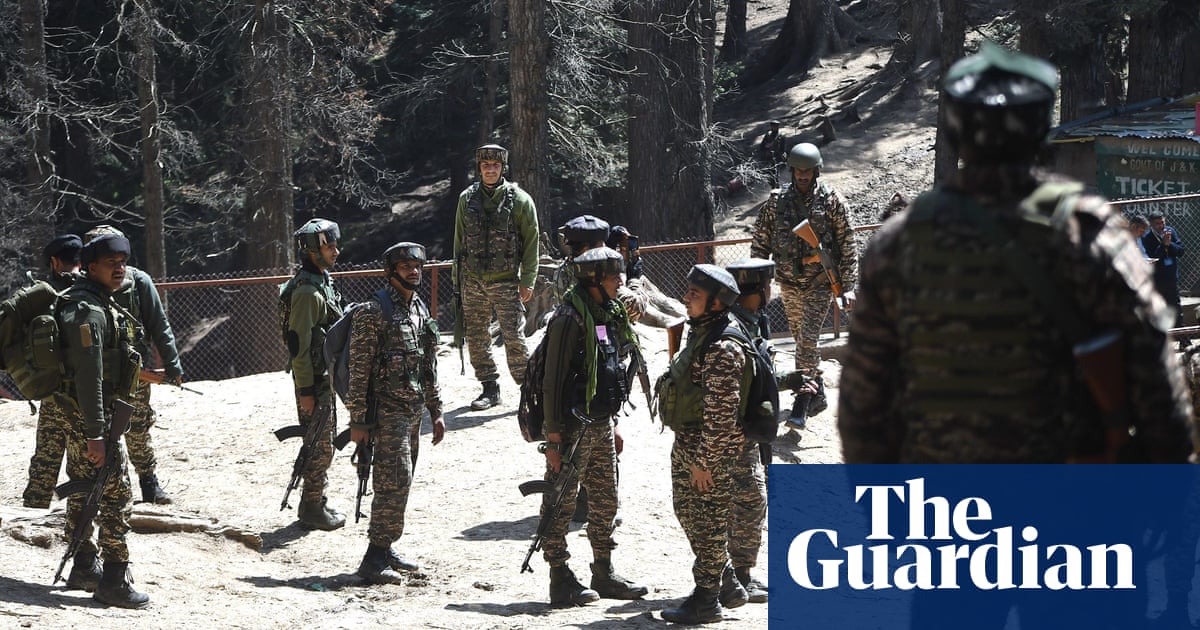Indian security forces fanned out across the Himalayan region ofKashmiras soldiers and police launched a massive manhunt for the perpetrators of a militant attack on Tuesday that killed at least 26 tourists.
Tens of thousands of armed police and soldiers headed to the region setting up checkpoints and searching vehicles, while many businesses remained closed after a call by religious and political figures.
“The search operation is currently in progress, with all efforts focused on bringing the attackers to justice,” the Indian army said in a statement.
The attack, apparently involving four gunmen, took place on Tuesday in a meadow in the Pahalgam area of the scenic Himalayan federal territory. The dead included 25 Indians and one Nepalese national in the worst attack on civilians in India since the 2008 Mumbai shootings.
The prime minister,Narendra Modi, cut short a two-day visit to Saudi Arabia and returned to New Delhi on Wednesday morning.
Modi held a meeting with his national security adviser, the foreign minister and other senior officials at the airport and a special security cabinet meeting was called for later on Wednesday.
The attack is seen as a setback to what Modi and his Hindu nationalist Bharatiya Janata party have hailed as a major achievement in revoking the semi-autonomous status Jammu and Kashmir enjoyed and bringing peace and development to the long-troubled Muslim-majority region.
Tuesday’s attack is being viewed as a major escalation in the regional conflict during which tourists had largely been spared. Attacks targeting tourists in Kashmir have been rare. The last deadly incident took place in June 2024 when at least nine people were killed and 33 injured after a militant attack caused a bus carrying Hindu pilgrims to plunge into a deep gorge.
A little-known militant group, the “Kashmir Resistance”, claimed responsibility for the attack in a social media message. It expressed discontent that more than 85,000 “outsiders” had been settled in the region, spurring a “demographic change”.
In a fresh statement on Wednesday, the group said that the “individuals targeted were not ordinary tourists; instead, they were linked to and affiliated with Indian security agencies”.
The attack sparked an immediate exodus of tourists from the region with airlines operating extra flights from Srinagar, the summer capital of the territory. Local television showed tourists carrying their bags to taxis and filing out of a hotel in Srinagar.
“How can we continue our trip in such a situation?” Sameer Bhardwaj, a tourist from New Delhi, told the news agency ANI. “We need to prioritise our safety. We can only travel if our minds are relaxed but everyone is tense here. So, we cannot continue to travel.”
“This attack will impact our work, but we are more concerned about the loss of lives,” said Gulzar Ahmad, a taxi driver in Pahalgam.
“No matter what we do in the future, our tourism industry has been stained by this attack. The perpetrators must receive exemplary punishment so that no one dares to commit such an act again.”
The attack occurred during a four-day visit to India by the US vice-president, JD Vance. He described the incident as a “devastating terrorist attack”.
Donald Trump also expressed solidarity, writing on social media, “The United States stands strong with India against terrorism.”
Other global leaders, including the Russian president, Vladimir Putin, and the Italian prime minister Giorgia Meloni, condemned the attack. The UN secretary general, António Guterres, said: “Attacks against civilians are unacceptable under any circumstances.”
“It’s heartbreaking to see the exodus of our guests from the (Kashmir) valley after yesterday’s tragic terror attack in Pahalgam.
“But at the same time, we totally understand why people would want to leave,” wrote Omar Abdullah, the region’s top elected official, on social media. He added that his administration had been directed to facilitate the smooth departure of tourist vehicles.
Abdullah recently stated in the regional assembly that 23 million tourists visited the region in 2024.
The disputed Himalayan region has witnessed a surge in the number of targeted killings of Hindus, including migrant workers from other Indian states, since New Delhi unilaterally revoked Kashmir’s limited autonomy in 2019 by imposing a communication blockade and jailing activists and political leaders.
The move split the state into two federally administered territories – Jammu and Kashmir, and Ladakh – and allowed local authorities to issue domicile certificates to outsiders, enabling them to apply for jobs and buy land. Since then, civil liberties and media freedom in the region have been severely curtailed.
Officials said investigations were ongoing to confirm the identity of the attackers and indicated they believed that Pakistani militant groups may be behind the attack.
However, there has been no official confirmation regarding the identities of the deceased or the perpetrators.
Pakistan’s Foreign Office spokesperson, Shafqat Khan, issued a statement saying: “We are concerned about the loss of tourists’ lives in the attack,” and extended condolences to the victims.
